Ronald Reagan Tributes
As one would expect, the major media have several tributes and reflections marking the passing of former President Ronald Reagan. (See this post from yesterday for the blogger tributes.) While they include criticism, most have emphasized the positive this morning. I’m sure that will change over the next few days.
WaPo — Ronald Reagan Dies: 40th President Reshaped American Politics
“This is a sad hour in the life of America,” Bush said after speaking with Nancy Reagan by telephone. “A great American life has come to an end. Ronald Reagan won America’s respect with his greatness and won its love with his goodness. He had the confidence that comes with conviction, the strength that comes with character, the grace that comes with humility and the humor that comes with wisdom.”
Blinking back tears, Bush added: “He always told us that for America, the best was yet to come. We comfort ourselves in the knowledge that this is true for him, too. His work is done. And now a shining city awaits him.”
It was an almost unbelievable life, a melodrama, a rags-to-riches tale, a multi-part saga written by someone with boundless imagination and an infinite sense of the possible. Born in tiny Tampico, Ill., educated at Eureka College in nearby Dixon, Reagan was a radio sportscaster, a Hollywood B-movie star, host of a TV variety show, a soap salesman, a motivational speaker, governor of California and — starting at age 53 — arguably the most important American political figure since Franklin D. Roosevelt.
So it was no wonder that he believed all things were possible, from the collapse of the Soviet Union, which he predicted even when the clash of superpowers seemed near its most menacing point, to the complete disarmament of all nuclear arsenals, which Reagan proposed in a stunning arms-control summit near the end of his administration. What seemed to some as naivete struck others as good old gumption.
Reagan was a champion salesman of the American dream, mayor-for-life of the land he called “a shining city on a hill.”
Democratic presidential candidate John F. Kerry said, “Ronald Reagan’s love of country was infectious,” and he praised the late president for his “goodwill in the heat of partisan battle.”
“Even when he was breaking Democrats’ hearts, he did so with a smile and in the spirit of honest and open debate. Despite the disagreements, he lived by that noble ideal that at 5 p.m., we weren’t Democrats or Republicans, we were Americans and friends,” said the senator from Massachusetts.
Like all forceful leaders, Reagan deeply angered some — but his gift for communication and his bedrock optimism attracted far more supporters than critics. In 1984, he was reelected with the largest number of popular and electoral votes in U.S. history. Though the nation has added about 50 million people since then, no candidate has surpassed his record. His electoral vote landslide that year was among the most lopsided in history.
NYT — Reagan Fought a Decade-Long Battle With Alzheimer’s Disease
To a nation hungry for a hero, a nation battered by Vietnam, damaged by Watergate and humiliated by the taking of hostages in Iran, Ronald Reagan held out the promise of a return to greatness, the promise that America would “stand tall” again.
Mr. Reagan lived longer than any United States president, spending his final years in seclusion as he coped with the mental debilitation of Alzheimer’s disease.
In 1994, he touched the hearts of Americans when, in a handwritten letter, he let it be known he was suffering from the illness. “I now begin the journey that will lead me into the sunset of my life,” Mr. Reagan wrote. “I know that for America there will always be a bright dawn ahead.”
Dan Balz and Mike Allen (WaPo) — Sagging GOP Rebuilt in His Image
Reagan’s 1980 campaign symbolized the emergence of the conservatives as the dominant force in the party 16 years after the Goldwater debacle, and Reagan owed much to the intellectual and ideological foundation laid by the Arizona senator in that losing cause. “Nixon was the old establishment, and Reagan picked up the conservative mantle from Goldwater and had a better ability to communicate the message,” said Ed Rollins, who managed Reagan’s 1984 campaign.
What the 1980 campaign demonstrated, to the surprise of many Democrats who underestimated his political skills, was Reagan’s ability to enunciate strong conservative principles without being threatening to a majority of Americans. With Carter weighed down by an economy plagued by rising oil prices and inflation out of control and a hostage crisis in Iran that continued throughout the year, Reagan exploited the country’s demoralized mood with an upbeat campaign in which he promised to return the country to greatness.
***
“Beginning with Roosevelt, the presumption was that if you had a problem, the federal government was going to solve it,” said David Keene of the American Conservative Union. “Beginning with Reagan, the presumption was that if you had a problem, government was likely to screw things up and you looked for a private solution.”
Reagan’s presidency brought a new term to the political lexicon: Reagan Democrats. His social conservatism, his unapologetic appeals to patriotism, his challenge to the Soviets and his economic policies brought onetime Democrats streaming into the Republican column. He won reelection in a landslide in 1984 with his “morning in America” message, carrying 49 states against former vice president Walter F. Mondale, leaving the Democratic Party a shambles and in need of reform.
“Without Ronald Reagan, we would not have the shift in partisanship where the parties are virtually split,” said Richard B. Wirthlin, who was Reagan’s pollster. “The Democratic Party could have extended its dominance much longer without Reagan’s appeal to blue-collar workers, some labor unions, the South and young people. Those were the four groups that moved most dramatically in 1980, and most of that shift has endured.”
WaPo — Hastening an End to the Cold War
Former president Ronald Reagan left as his greatest legacy to the world a role in helping accelerate the end of the Cold War. The global competition between the United States and the Soviet Union, which consumed both nations for 46 years, cost hundreds of billions of dollars and led to building of the most destructive weapons ever known, reached a peak during Reagan’s White House days and then expired only a few years after he left office.
The reasons for this extraordinary turn of events are larger than Reagan and span events far beyond his presidency. The roots can be found in the stagnation of the Soviet system in the late 1970s and early 1980s and perhaps most importantly in the ascension of Soviet leader Mikhail Gorbachev, who opened the floodgates of change.
***
Early in his presidency, when he called the Soviet Union the “focus of evil in the modern world,” Reagan’s actions generated suspicion and paranoia among the aging leaders in Moscow. As the U.S. military buildup accelerated, the superpowers came closer to a confrontation than at any time since the Cuban missile crisis in 1962. Former CIA director Robert M. Gates has recalled that 1983 was the most dangerous year of the last half of the Cold War, marked by the Soviet shooting down of Korean Air Lines Flight 007 and a NATO exercise that Soviet leaders misinterpreted as a possible preparation for war. It was also the year that Reagan announced his dream of a defensive shield against ballistic missiles.
Reagan’s ardent anti-Communist rhetoric was extremely controversial in its time, but events have shown he was prescient and probing about the depth of Soviet internal weaknesses. In an address to the British Parliament on June 8, 1982, Reagan declared that the Soviet Union was in the midst of a “great revolutionary crisis” and expressed hope that Marxism-Leninism would wind up “on the ash heap of history.”
Reagan noted the depth of Soviet economic stagnation. “The dimensions of this failure are astounding,” he said. “A country which employs one-fifth of its population in agriculture is unable to feed its own people. . . . Overcentralized, with little or no incentives, year after year the Soviet system pours its best resources into the making of instruments of destruction.”
AP– Bush Comments on Reagan Death
This is a sad hour in the life of America. A great American life has come to an end.
I have just spoken to Nancy Reagan. On behalf of our whole nation, Laura and I offered her and the Reagan family our prayers and our condolences.
Ronald Reagan won America’s respect with his greatness, and won its love with his goodness. He had the confidence that comes with conviction, the strength that comes with character, the grace that comes with humility, and the humor that comes with wisdom.
He leaves behind a nation he restored and a world he helped save.
During the years of President Reagan, America laid to rest an era of division and self-doubt. And because of his leadership, the world laid to rest an era of fear and tyranny.
Now, in laying our leader to rest, we say thank you.
He always told us that for America, the best was yet to come. We comfort ourselves in the knowledge that this is true for him, too. His work is done. And now a shining city awaits him.
May God bless Ronald Reagan.
Ron Brownstein (LA Times) — Effect on U.S. Politics Still Felt
No one since Franklin D. Roosevelt reshaped American politics or restored the primacy of the presidency more than Ronald Reagan.
Reagan redefined the message of the Republican Party, expanded its reach to working-class voters who had rejected it for decades, and put in place the final pieces of a conservative alliance that has carried the GOP to unified control of Congress and the White House for the first time in half a century.
As the “Great Communicator,” Reagan changed the way presidents pursued their goals, elevating the role of direct communication with the public through television. He hastened the realignment of the South from solidly Democratic to the cornerstone of GOP strength. And he crystallized an antigovernment populism that still constrains Washington’s role in society.
During the New Deal period ushered in by Roosevelt, “the burden of proof was on those who tried to argue that government should not act,” said veteran Democratic strategist Bill Galston. “But in the era of Reagan, which I think we are still in, the burden of proof is on those who think the government should act. And if you bear the burden of proof, you have the problem.”
Doyle McManus (LA Times) — A Cold War Hawk Who Set the Stage for Peace
When Ronald Reagan entered the White House in 1981, the United States faced two major foreign policy challenges: the generation-long Cold War with the Soviet Union, and an unfamiliar new threat from militant Islamic movements, which had seized power in Iran and sought to end American influence in the Middle East.
To critics’ surprise, Reagan made major progress toward ending the Cold War; the Berlin Wall, the stark symbol of Europe’s division between communism and democracy, came down less than a year after he left office.
But in the struggle against Islamic militants who launched terrorist attacks against Americans, Reagan’s accomplishments were more ambiguous. In 1986, Reagan sent military aircraft to attack Libya after concluding that its leader, Col. Moammar Kadafi, had ordered a terrorist attack against American troops in Germany. But another military intervention, in Lebanon in 1983, ended in ignominy after a suicide bomber killed 241 U.S. service personnel in Beirut.
Reagan’s presidency reached its low point as a byproduct of terrorism, when he approved an abortive attempt to ransom American hostages in Lebanon through secret weapons sales to Islamic fundamentalist Iran — a scheme that led to the Iran-Contra scandal over the arms deals and secret payments to right-wing Nicaraguan rebels with the proceeds.
Still, to his admirers and to an increasing consensus of historians, Reagan will be remembered less for his failings in what would later be called a “war on terrorism,” and more for his success in bringing the Cold War to an end.
George Will — An Optimist’s Legacy
One measure of a leader’s greatness is this: By the time he dies the dangers that summoned him to greatness have been so thoroughly defeated, in no small measure by what he did, it is difficult to recall the magnitude of those dangers or of his achievements. So if you seek Ronald Reagan’s monument, look around and consider what you do not see.
The Iron Curtain that scarred a continent is gone, as is the Evil Empire responsible for it. The feeling of foreboding — the sense of shrunken possibilities — that afflicted Americans 20 years ago has been banished by a new birth of the American belief in perpetually expanding horizons.
In the uninterrupted flatness of the Midwest, where Reagan matured, the horizon beckons to those who would be travelers. He traveled far, had a grand time all the way, and his cheerfulness was contagious. It was said of Dwight Eisenhower — another much-loved son of the prairie — that his smile was his philosophy. That was true of Reagan, in this sense: He understood that when Americans have a happy stance toward life, confidence flows and good things happen. They raise families, crops, living standards and cultural values; they settle the land, make deserts bloom, destroy tyrannies.
Reagan was the last president for whom the Depression — the years when America stopped working — was a formative experience. Remarkably, the 1930s formed in him a talent for happiness. It was urgently needed in the 1980s, when the pessimism of the intelligentsia was infecting people with the idea that America had passed its apogee and was ungovernable.
It also was said then that the presidency destroyed its occupants. But Reagan arrived at the office, looked around and said, “This is fun. Let’s saddle up and go for a ride.” Which he did, sometimes in the middle of the afternoon. Scolds, who thought presidents were only serious when miserable, were scandalized.
In an amazingly fecund 27-month period, Margaret Thatcher, Pope John Paul II and Reagan came to office. The pope and the president had been actors. Reagan said he wondered how presidents who have not been actors could function. Certainly the last century’s greatest democratic leaders — Churchill, FDR — mastered the theatrical dimension of politics.
Good actors, including political actors, do not deal in unrealities. Rather, they create realities that matter — perceptions, aspirations, allegiances. Reagan in his presidential role made vivid the values, particularly hopefulness and friendliness, that give cohesion and dynamism to this continental nation.
A democratic leader’s voice should linger in his nation’s memory, an echo of his exhortations. Reagan’s mellifluous rhetoric lingers like a melody that evokes fond memories. Because of demagogues, rhetoric has a tainted reputation in our time. However, Reagan understood that rhetoric is central to democratic governance. It can fuse passion and persuasion, moving free people to freely choose what is noble.
He understood the axiom that people, especially Americans, with their Founders’ creed and vast reservoirs of decency, more often need to be reminded than informed. And he understood the economy of leadership — the need to husband the perishable claim a leader has on the attention of this big, boisterous country.
Joe Klein (Time) — The Secrets of Reagan’s Success
Unlike other Presidents—except, perhaps, for Abraham Lincoln and Andrew Jackson—Reagan came to power as the leader of an ideological movement: in his case, a fierce conservatism forged and tempered by decades of disdain from the nation’s moderate media and political establishment. In retrospect, the movement provided a necessary corrective for the slowly corroding industrial-age liberalism favored by the Democrats who controlled Congress. Reagan’s followers were so eager for success that they were willing to tolerate some flagrant inconsistencies in his governance. His big 1981 tax cut was followed by two years of large, if undramatized, tax increases. He didn’t shrink the size of the government (Bill Clinton was the only recent President to do that). Reagan was a champion of the religious right, but rarely attended church and never paid much more than lip service to the right-to-life movement. He was a critic of government waste, but routinely lavished more money on the military than the Pentagon asked for—and he stubbornly insisted on funding an utterly preposterous missile-defense program that his detractors, and eventually his supporters, called Star Wars.
As it happened—as Hollywood would have seen fit to script it—the only people aside from Reagan who really believed in Star Wars were the military leadership of the Soviet Union. The Zap! Pow! Bam! comic-book defense strategy reinforced Moscow’s growing despair about the future and hastened the end of the cold war. And that, finally, is what has proved most galling to the Gipper’s ideological opponents: his glossy Hollywood optimism proved more supple than the professional pessimism of the intellectual left. Ultimately, Reagan’s sloppy and often insensitive domestic governance will have little impact on his place in history. His willingness to break the law and defy Congress by funding the contras in Nicaragua and surreptitiously attempting to trade arms for hostages with Iran—these will be footnotes as well. Reagan will mostly be remembered for his unyielding opposition to the Soviet Union, for his willingness to call a regime that murdered at least 40 million of its citizens “evil.”
In fact, I didn’t understand how truly monumental, and morally important, Reagan’s anticommunist vision was until I visited the Soviet Union in 1987. My first night there, I was escorted to the Bolshoi Ballet by two minders from the U.S.-Canada Institute. The Russians were thrilled that I had figured out the Cyrillic alphabet and was able to read the program. The young woman on my left rewarded me with a smile—a rare public act in that terrifying regime—and a whispered encouragement: reform was coming. Glasnost and perestroika, she assured me, were real. The minder on my left, a chunky young man, then nudged me with his elbow. “Ronald Reagan. Evil empire,” he whispered with dramatic intensity, and shot a glance down to his lap where he had hidden two enthusiastic thumbs up. “Yes!”
Lou Cannon — Actor, Governor, President, Icon
A movie actor who became one of the most popular presidents of the 20th century, Ronald Wilson Reagan redefined the nation’s political agenda and dramatically reshaped U.S.-Soviet relations while serving as president from 1981 to 1989.
After leaving office, Reagan suffered in his final years from the mind-destroying illness of Alzheimer’s disease. He announced his condition Nov. 5, 1994, in a poignant letter to the American people in which he thanked them “for giving me the great honor of allowing me to serve as your president.”
Often called the Great Communicator, the Republican president was an icon to American conservatives, whom he led out of the political wilderness. But his legacy eluded easy ideological classification. Former Senate Republican leader Howard H. Baker Jr. (Tenn.), who served as White House chief of staff during a key period in the Reagan presidency, observed that Reagan, despite a proclaimed constancy of values, also displayed “a capacity to surprise.”
This capacity was especially evident in Reagan’s dealings with Soviet leader Mikhail Gorbachev. Although Reagan was an outspoken anti-communist who described the Soviet Union as an “evil empire,” he forged a constructive relationship with the reform-minded Gorbachev, who ascended to power midway through the Reagan presidency.
***
There is general agreement, however, that the meetings between Gorbachev and Reagan and later between Gorbachev and President George H.W. Bush eased the transition from Cold War to peace. Alexander Bessmertnykh, deputy Soviet foreign minister during the Gorbachev-Reagan summits, said at a 1993 conference at Princeton that both Reagan and Gorbachev were more farsighted than their advisers in their idealistic determination to reduce nuclear arsenals.
***
Even Reagan’s critics acknowledge that he was a masterful political performer. Theodore Roosevelt termed the presidency a “bully pulpit,” and Franklin D. Roosevelt gave this pulpit a new dimension in the radio age with folksy “fireside chats.” Reagan, a former Democrat who had voted three times for FDR and admired him, adapted the bully pulpit to television. He sometimes borrowed directly from FDR. A refrain that became a frequent punch line of Reagan’s 1980 campaign speeches — “Are you better off today than you were four years ago?” — was a variant of an FDR comment in a 1934 fireside chat.
WaPo — LBJ’s 1973 Funeral to Be Model For Farewell to 40th President
Planners say Ronald Reagan’s state funeral, to include a 24-hour lying in state in the U.S. Capitol and a service at Washington National Cathedral, will closely follow that of Lyndon B. Johnson in 1973.
Reagan’s family has the final say on the four days of observances, the schedule for which is expected to be finalized today, said one federal official involved in the planning. The ceremonies are being planned “down to the minute,” the official said on condition of anonymity. It will be the first presidential funeral in Washington since Johnson’s; Richard M. Nixon was buried in Yorba Linda, Calif., in 1994.
Initial plans call for Reagan’s body to lie in state for a day at the Ronald Reagan Presidential Library in Simi Valley, Calif. The body then will be flown to Andrews Air Force Base on Wednesday, arriving at 5 p.m. It will be driven in a motorcade to Washington, and plans call for it then to be taken by horse-drawn caisson to the Capitol.
A viewing for national and world leaders will be held in the Capitol Rotunda, after which the former president will lie in state for 24 hours. In that time, the public will be allowed to enter via the West Front Terrace, and crowds can assemble at Third Street.
The day of the funeral, the body will be carried by caisson in a procession from the Capitol to a spot near the White House. From there, a hearse will carry the coffin to the cathedral for a funeral officiated by the newly nominated ambassador to the United Nations, John C. Danforth, an Episcopal minister and a former Republican senator from Missouri.
Afterward, the former president’s body will be taken directly to Andrews Air Force Base and flown to California. Reagan will be buried in a wooded grove overlooking the Pacific Ocean at the presidential library, according to Cary Garman, chief financial officer of the Ronald Reagan Presidential Foundation.
Heavy attendance by foreign dignitaries is expected, particularly with the summit of the Group of Eight to take place 600 miles south of Washington at Sea Island, Ga., on Tuesday through Thursday.
Update: Apparently, this is the enduring image of Reagan:


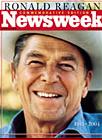
An interesting retrospective:
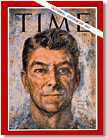
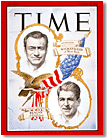
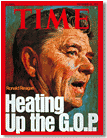
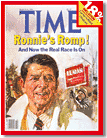
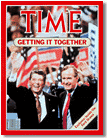
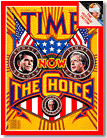
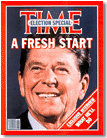
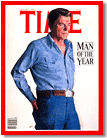
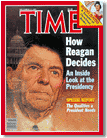

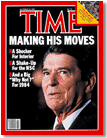
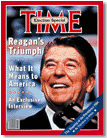
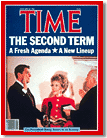
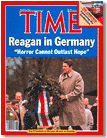
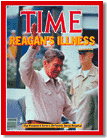
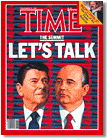
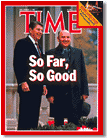
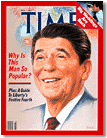
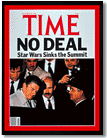
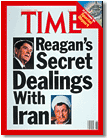
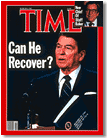
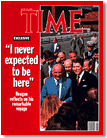
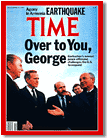
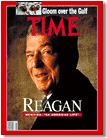

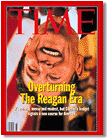
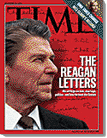
LA Times has a very large special section looking back at the longtime Californian.
NYT — Reagan Story Archive
AP — A Chronology of Reagan’s Life
WSJ — It Was Twenty Years Ago Today President Reagan’s speech commemorating the 40th Anniversary of D-Day on today, the 60th Anniversary
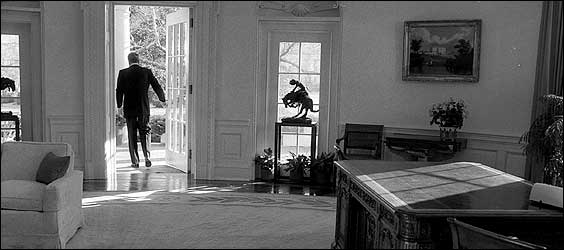
Update: Monday’s round of tributes is summarized here.




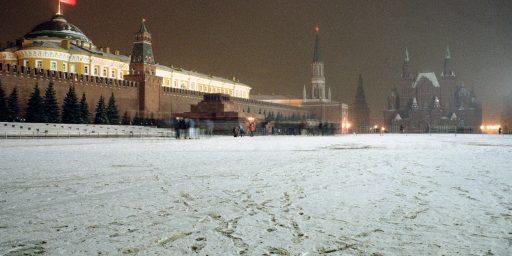
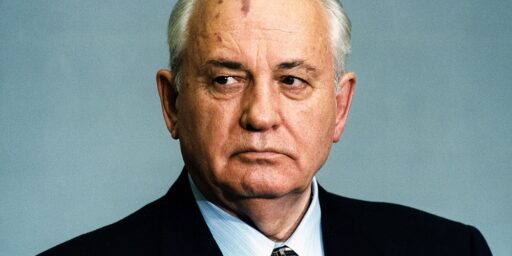
Thanks
I am truly saddened by President Reagan’s passing. I have loved him from the time I was six years old. He was such a beacon in our country and he led us in the right direction.
I will truly miss his American spirit.
Maybe the CONS should have him stuffed, mounted and put into a glass case so they can worship him from now on. Sainthood should be right around the corner.
Get real people, Reagan was a lousy president. He ACTED the whole part and did a fair job. As for him singlehandedly ending the Cold War, that is so much horse sh*t it isn’t even funny. He JUST HAPPENED to be in the Oval Office at the right time in history. Outspending the Russians and sending this country into a record deficit ended the Cold War against a country with one tenth our GNP. Thanks for nothing Ronnie, you started the modern Neoconservative movement that has continued with the moron in the Oval Office today.
Why does no one remember Iran Contra and the Sandanistas murderous rampages on thousands of innocents? Does it too closely resemble the slaughter and torture of the innocents under GWB?
Say something good about the dead? Good, he’s dead.
Maddalfred-
“Say something good about the dead? Good, he’s dead.”
Typical liberal, can’t have respect for someone in death, can’t tolerate conservatives but yet claim we’re the ones who are intolerant (amazing irony), and can’t act with any sense of common decency. He died a very slow, miserable death of Alzheimer’s. I certainly hope that when you die no one says something as disrespectful and hurtful and mean-spirited as your above quote. Of course, being as venemous as you are, I wouldn’t be surprised by that at all because you certainly would deserve no better.
Reagain was a symbol of American strength and most importantly American pride. He was the strongest force behind the fall of the USSR and then end of the Cold War, even the most liberal of historians have said as much. This is a very sad loss for America and the world.
I am swamped with pending work right now, but I will try to remember to link to these entries of yours… Thank you, Dr. Joyner, for these compilations. I was born in the first year of the Reagan presidency, and I do not remember much from his actual administration, but I learned more about President Reagan later. He was the greatest president of our time, and one of the greatest Americans who ever lived.
Please check out the current home page of Young America’s Foundation [YAF.org]… I went to that site on Saturday night, and they had already set up a new website in remembrance of President Reagan:
http://www.rememberronaldreagan.com
Thank you again for putting together this information. Keep up the good work.
I respect the office of the presidency, and Mr. Reagan’s ability to rise to that level. I console his family on their loss.
As for Mr. Reagan himself? While smiling and joking his way into the history books, his actual legacy is this: He was anti-labor. The biggest deficit spender in history (until our present fiasco of a president). Originator of the Big Lie. Hypocrite.
Mr. Reagan oversaw the beginnings of the dismantling of American manufacturing and sourcing jobs overseas. He turned his back on the laws regarding corporate mergers, creating fertile ground in our move towards the United States of Corporate America.
He was the originator of Justified Meanness: The idea that it was OK for someone to feel good that they had an obscene amount of money while others starved. After all: you earned it. You deserved it. The other guy has nothing? That’s his fault.
Reagan originated the “trickle down” economic theory, a continuing fallacy still practiced by the our modern day liar of a president.
Iran-Contra. Lies. The Sandinistas. More lies. Dismantling of America’s system for treatment of the mentally ill.
I could go on but you get my drift. I hope history judges this man by his record and not by Propaganda.
Good-bye Ron. You’ve created one hell of a mess.
One For the Gip
Written in memory of “The Great Communicator” Ronald Wilson Reagan
1911-2004
And he paused before entering the stars. And an angel, seeing who he was, said to him,
“Is there anything you’d like to say to them before you enter?” And he turned, looked
upon the fields of the earth and spoke…
Some future day, when the game seems too tough
And the field that’s before you seems jagged and rough
See if the boys will still stand and be winners
And go in there and win just one more for the Gipper
Try and see what you are and what you can be
“For G-d and Country” still hold the most sacred of dreams
“Tear down that wall” grasp America’s hand
Hold Freedom’s Lamp upon Liberty’s Land
You must believe in a cause and believe in a way
And believe,
That the fields filled with honor and the goal can sustain…
Those times when you carry the ball your own
For leadership and life are not perfections in stone
For I made mistakes on my run as I strode for the peaks
There were times I had doubt, but never was weak
With any great change you must speak what’s inside
And find a team, such as mine, who will stand by your side
My truest teammate was my hope and my life
She was more than a friend; she was my essence and light
She believed in the cause no matter the pain
And never wavered or doubted when the breaks came our way
Because the games never over, for its values play on
Just as freedom and honor need a team who stands strong
Who believe that challenge is one they can meet
By winning with strength, great love and new peace
For the games only won by those paying the price
Who understand commitment and faith and pride’s sacrifice
Who stand tall through the shouts when things aren’t going their way
Who know,
They may change it around with the very next play
So believe in yourself, remember the dream
Then victory’s yours and the touchdown achieved
And when you strive for this challenge and unite as Hope’s winners
I don’t know where I’ll be, but that’ll be one for the Gipper
So I hope that you’ll play under Liberty’s Will
And remember,
We’ll pass someday on “that shining city on the hill”
For I leave behind a life fully lived
It’s your turn to run, to score and to give
So years from now when you’ve forgotten my name
There will be a time when its rough and you’ll feel beat in the game
But go out there; stand tall, with ALL that you are
And that’ll be one for the Gip, as I look down from the stars
And that’ll be one for the Gip, as I look down from the stars
In Lasting Name and Memory,
Eric S. Kingston
http://www.unitedpeacecouncil.org
Copyright 2004 esk